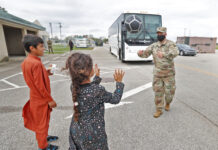BEIRUT — Hundreds of Kurdish-led forces in northeast Syria arrested on Sunday nine people, including suspected members of the Islamic State group, during a security sweep in a sprawling camp in northeastern Syria housing families of militants.
The campaign by nearly 5,000 of the U.S-backed Kurdish-led forces came on the heel of a spike in violence in al-Hol camp, home to over 60,000 people, many of them supporters or families of IS.
The forces, in a statement published on the Kurdish Hawar news agency, said they arrested nine people, including an Iraqi IS member who worked in recruitment. Violence has increased in the past months, where 47 people were killed by IS supporters inside the camp since the start of the year, the statement said.
The campaign will continue, the forces said. In a tweet Sunday, the spokesman for the U.S-led Coalition Col. Wayne Marotto said the Kurdish-led forces are also enrolling residents in the camps using biometric technology to help “maintain security by identifying (those residing in the camp) connected to terrorist activities.”
Marotto said the campaign is aimed at improving safety and security of those living in the camp.
It has been two years since the U.S.-led coalition captured the last sliver of territory held by IS, ending their self-declared caliphate that covered large parts of Iraq and Syria. The brutal war took several years and left U.S.-allied Kurdish authorities in control of eastern and northeast Syria, with a small presence of several hundred American forces still deployed there.
Since then, remaining IS militants have gone underground in the Syrian-Iraqi border region, continuing an insurgency. Thousands of wives, widows, children and other family members or supporters of IS who had stayed in the last sliver of land the group held were moved to the camp or prisons.
The majority of the residents of al-Hol, the largest group of held IS supporters, are Iraqis and Syrians. But they also include other nationalities. The camp has been chaotic, with the hardcore militants among its population enforcing their will on others and seeking to prevent them from cooperating with Kurdish authorities guarding it.



